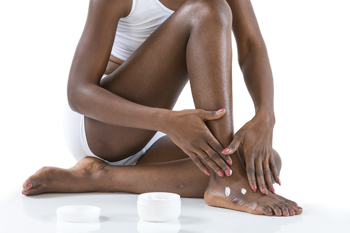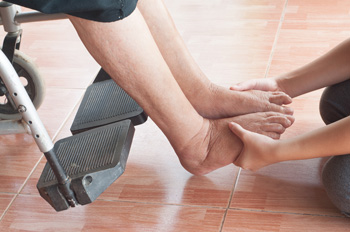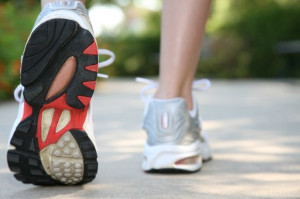Blog
What Can Cause an Ingrown Toenail to Develop?
 An ingrown toenail is a common foot condition that affects millions of people worldwide. It happens when the outer edge of the nail grows into the skin. This can occur for a variety of reasons consisting of genetic factors, wearing shoes that do not have adequate room for the toes to move freely in, or possibly from toenails that are shaped abnormally. Additionally, trimming the toenails incorrectly may cause ingrown toenails to develop. Some of the symptoms that are associated with this ailment can include redness and tenderness surrounding the affected nail, and in severe cases, there may be a discharge coming from the nail. Research has indicated that diabetic patients may be prone to developing ingrown toenails, in addition to patients that have poor circulation. If you would like more information about how to treat and prevent ingrown toenails, please schedule an appointment with a podiatrist.
An ingrown toenail is a common foot condition that affects millions of people worldwide. It happens when the outer edge of the nail grows into the skin. This can occur for a variety of reasons consisting of genetic factors, wearing shoes that do not have adequate room for the toes to move freely in, or possibly from toenails that are shaped abnormally. Additionally, trimming the toenails incorrectly may cause ingrown toenails to develop. Some of the symptoms that are associated with this ailment can include redness and tenderness surrounding the affected nail, and in severe cases, there may be a discharge coming from the nail. Research has indicated that diabetic patients may be prone to developing ingrown toenails, in addition to patients that have poor circulation. If you would like more information about how to treat and prevent ingrown toenails, please schedule an appointment with a podiatrist.
Ingrown toenails can become painful if they are not treated properly. For more information about ingrown toenails, contact one of our podiatrists of Pennsylvania. Our doctors can provide the care you need to keep you pain-free and on your feet.
Ingrown Toenails
Ingrown toenails occur when a toenail grows sideways into the bed of the nail, causing pain, swelling, and possibly infection.
Causes
- Bacterial infections
- Improper nail cutting such as cutting it too short or not straight across
- Trauma to the toe, such as stubbing, which causes the nail to grow back irregularly
- Ill-fitting shoes that bunch the toes too close together
- Genetic predisposition
Prevention
Because ingrown toenails are not something found outside of shoe-wearing cultures, going barefoot as often as possible will decrease the likeliness of developing ingrown toenails. Wearing proper fitting shoes and using proper cutting techniques will also help decrease your risk of developing ingrown toenails.
Treatment
Ingrown toenails are a very treatable foot condition. In minor cases, soaking the affected area in salt or antibacterial soaps will not only help with the ingrown nail itself, but also help prevent any infections from occurring. In more severe cases, surgery is an option. In either case, speaking to your podiatrist about this condition will help you get a better understanding of specific treatment options that are right for you.
If you have any questions please feel free to contact one of our offices located in Plymouth Meeting and Ambler, PA . We offer the newest diagnostic and treatment technologies for all your foot and ankle needs.
Four Tips for Healthy Feet
 Your feet carry you throughout your life, supporting the weight of your body. Maintaining the health of your feet is essential and there are many simple ways to keep the feet healthy. Check your feet regularly for any abnormalities, such as cracks, cuts, scrapes, sores, or discoloration. If caught early, most foot problems can be promptly and effectively treated by a podiatrist. Visually checking your feet is especially important if you have medical conditions like diabetes, poor circulation, or peripheral neuropathy, as you may not feel or notice an injury until it has progressed significantly. Keep your feet clean by washing them with soap and water and drying them thoroughly, especially in the area between the toes. Wear shoes that fit comfortably and trim your toenails regularly. For more information about everyday foot care, please speak with a podiatrist.
Your feet carry you throughout your life, supporting the weight of your body. Maintaining the health of your feet is essential and there are many simple ways to keep the feet healthy. Check your feet regularly for any abnormalities, such as cracks, cuts, scrapes, sores, or discoloration. If caught early, most foot problems can be promptly and effectively treated by a podiatrist. Visually checking your feet is especially important if you have medical conditions like diabetes, poor circulation, or peripheral neuropathy, as you may not feel or notice an injury until it has progressed significantly. Keep your feet clean by washing them with soap and water and drying them thoroughly, especially in the area between the toes. Wear shoes that fit comfortably and trim your toenails regularly. For more information about everyday foot care, please speak with a podiatrist.
Everyday foot care is very important to prevent infection and other foot ailments. If you need your feet checked, contact one of our podiatrists from Pennsylvania. Our doctors can provide the care you need to keep you pain-free and on your feet.
Everyday Foot Care
Often, people take care of their bodies, face and hair more so than they do for their feet. But the feet are a very important aspect of our bodies, and one that we should pay more attention to. Without our feet, we would not be able to perform most daily tasks.
It is best to check your feet regularly to make sure there are no new bruises or cuts that you may not have noticed before. For dry feet, moisturizer can easily be a remedy and can be applied as often as necessary to the affected areas. Wearing shoes that fit well can also help you maintain good foot health, as well as making it easier to walk and do daily activities without the stress or pain of ill-fitting shoes, high heels, or even flip flops. Wearing clean socks with closed shoes is important to ensure that sweat and bacteria do not accumulate within the shoe. Clean socks help to prevent Athlete’s foot, fungi problems, bad odors, and can absorb sweat.
If you have any questions please feel free to contact one of our offices located in Plymouth Meeting and Ambler, PA . We offer the newest diagnostic and treatment technologies for all your foot and ankle needs.
Why Is Podiatry So Important for Older Adults?
 Foot pain is difficult for anyone to deal with, particularly for elderly patients who may already be experiencing challenges with mobility. There are many factors that cause immobility in older adults such as physiological changes, gait issues, arthritis, obesity, diabetes, impaired balance and more. Geriatric foot pain and a reduction in mobility can take its toll not only physically, but mentally and socially as well. Mobility problems can have a ripple effect on an older person’s life—leading to cognitive decline, depression, falls, hospitalization, substance abuse, even incontinence and urinary tract infections. If you or someone you care about has chronic foot pain or difficulty walking or climbing stairs, contact a podiatrist who can evaluate the situation and develop a treatment plan to help reduce pain, increase mobility, and improve the quality of life.
Foot pain is difficult for anyone to deal with, particularly for elderly patients who may already be experiencing challenges with mobility. There are many factors that cause immobility in older adults such as physiological changes, gait issues, arthritis, obesity, diabetes, impaired balance and more. Geriatric foot pain and a reduction in mobility can take its toll not only physically, but mentally and socially as well. Mobility problems can have a ripple effect on an older person’s life—leading to cognitive decline, depression, falls, hospitalization, substance abuse, even incontinence and urinary tract infections. If you or someone you care about has chronic foot pain or difficulty walking or climbing stairs, contact a podiatrist who can evaluate the situation and develop a treatment plan to help reduce pain, increase mobility, and improve the quality of life.
If you need your feet checked, contact one of our podiatrists of Pennsylvania. Our doctors will attend to all of your foot and ankle needs and provide you with quality treatment.
Geriatrics and Podiatry
When people age, some common issues that may occur are bone density loss, dry skin, poor circulation, and rough brittle nails. These issues may also affect your foot health if the necessary steps are not taken to alleviate the problems.
It is important to take care of your feet because feet that are injured or diseased can affect your overall health. Having painful feet hinders your ability to do daily activities or may decrease your willingness to do the things that you need to do.
Visiting Your Geriatrician
As we age, health problems become more likely, so it is essential to visit your doctor for check-ups to ensure that you are doing the best you can to take care of your health. It is recommended to check your feet frequently for any possible cuts, bruises, swelling, corns or any other irregularities.
Taking Care of Elderly Feet
Cracked or dry feet can be treated by applying moisturizer often. It is also important not to wear old socks because the older the sock is, the higher the possibility there will be that there is bacteria there. Wear fresh socks and make sure they fit properly.
Proper foot health means that you can have a more active lifestyle and you will not be bogged down by pain. Foot health also leads to good circulation, which is paramount for overall health.
If you have any questions, please feel free to contact one of our offices located in Plymouth Meeting and Ambler, PA . We offer the newest diagnostic tools and technology to treat your foot and ankle needs.
Shoes With Toe Springs May Affect Foot Biomechanics
Many popular athletic brands have running and walking shoes with an upward curvature in the toe area, known as a toe spring. Wearing shoes with toe springs requires less work from the muscles of the feet while walking, especially compared to walking in shoes with flatter soles. Because they can contribute to the weakening of foot muscles when they are worn habitually over long periods of time, shoes with toe springs may contribute to the onset of various foot problems. One common foot problem that may result from wearing these shoes is plantar fasciitis, in which the tissue running along the bottom of the foot becomes inflamed and painful. When it comes to footwear, it is suggested that you consult with a podiatrist to find out which type of shoes are right for you.
If you have any concerns about your feet, contact one of our podiatrists from Pennsylvania. Our doctors can provide the care you need to keep you pain-free and on your feet.
Biomechanics in Podiatry
Podiatric biomechanics is a particular sector of specialty podiatry with licensed practitioners who are trained to diagnose and treat conditions affecting the foot, ankle and lower leg. Biomechanics deals with the forces that act against the body, causing an interference with the biological structures. It focuses on the movement of the ankle, the foot and the forces that interact with them.
A History of Biomechanics
- Biomechanics dates back to the BC era in Egypt where evidence of professional foot care has been recorded.
- In 1974, biomechanics gained a higher profile from the studies of Merton Root, who claimed that by changing or controlling the forces between the ankle and the foot, corrections or conditions could be implemented to gain strength and coordination in the area.
Modern technological improvements are based on past theories and therapeutic processes that provide a better understanding of podiatric concepts for biomechanics. Computers can provide accurate information about the forces and patterns of the feet and lower legs.
Understanding biomechanics of the feet can help improve and eliminate pain, stopping further stress to the foot.
If you have any questions please feel free to contact one of our offices located in Plymouth Meeting and Ambler, PA . We offer the newest diagnostic and treatment technologies for all your foot and ankle needs.

